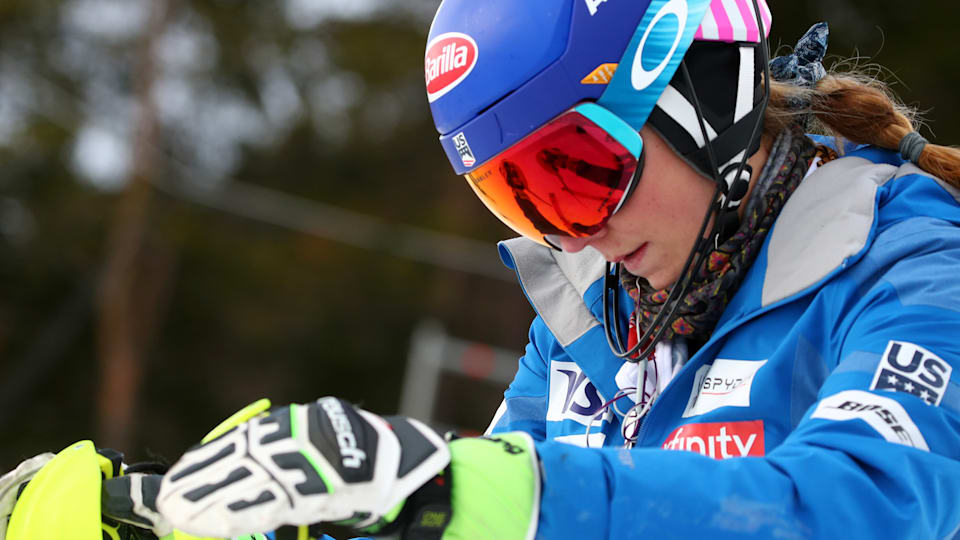Mikaela Shiffrin: How I relate to the pressure felt by Simone Biles in Tokyo
Mikaela Shiffrin makes skiing appear effortless, but the reality is somewhat different for the double Olympic champion. The 26-year-old explains how she has struggled with her mental demons in the lead-up to Beijing 2022.

Alpine skiing superstar Mikaela Shiffrin would like you to know that the Olympic Games are not all “rainbows and sunshine and butterflies”.
The year leading up to the Olympic Winter Games Beijing 2022 has not been kind to the alpine skier. The 26-year-old continues to mourn her father, has struggled with a back problem, and caught COVID-19. Plus everyone assumes she’ll win everything.
Winning doesn’t just happen because you arrive at the start gate and you’re the best skier, says the two-time Olympic gold medallist.
Simone Biles’ withdrawal from some events at the Olympic Summer Games Tokyo 2020 in order to protect her mental health, shows what she’s talking about.
"What I know from that kind of pressure is: It is not easy to win. Ever." - Mikaela Shiffrin to AP.
"One hundred percent that people didn't even consider her for any other spot,” said Colorado-born Shiffrin in an interview.
“It was like the gold medal was there, written with her name on it, but she still had to go and flip and twist through the air with perfection in order to actually earn this medal that was decided it was supposed to be for her."
Mikaela Shiffrin: It's always scary
The sense that the wider public doesn’t always understand the extreme requirements to win gold translates directly to skiing.
“It’s always scary,” Shiffrin said in an interview with The Associated Press.
“You can’t really control the outcome beyond your own skiing. And that’s a really uncomfortable place to be.
“If you add on top of that expectations from anybody, be it just somebody looking on livestreaming or looking at your Instagram posts to your coaches who are standing on the hill, and they want you to succeed.”
When Shiffrin lost her father, this only added to the sense of fear. 2 February marks the second anniversary of his sudden death in an accident. Shiffrin says that his passing meant that her and her mother, also her one of her coaches, lost their safety net.
“So my Mum and I, we don’t feel safe,” she said.
“And that has to do with the pandemic as well and general frustrations with people not seeming to get it.”
By “it”, she means social distancing and people who aren’t taking the pandemic seriously.
Just as her Olympic preparation was intensifying in December, Shiffrin contracted COVID.
The American had never taken more than four days off skiing in her career. Now she was shut in a hotel room in Austria, her mother on the other side of the wall. She had a 15kg plate and her bedframe to train with.
Shiffrin had already felt under pressure due to a back problem she was still struggling with in November.
“I could definitely use a lot more reinforcement,” Shiffrin said then. “Unfortunately, there’s just not really a whole lot of time for that. I don’t really expect to feel ready to race. At this point, I never actually feel ready.
“You just race, I guess.”
After her release from COVID isolation, the Team USA star did just that. She tried to view her slalom run in the World Cup event in Schladming, Austria as a training run. But at the start gate, the fatigue and introspection kicked in.
Then she spied her United States of America team-mate Paula Moltzan warming up. Her routine was so elastic, Shiffrin couldn’t contain a chuckle.
The moment of mirth unlocked something in Shiffrin.
“I just kind of clomped down, and I just skied,” she told the Washington Post. Shiffrin didn’t just ski, she just won, and handsomely.
Maybe that’s where she found the confidence to put the pressure back on herself. The six-times world champion hopes to ski in all five alpine events at Beijing 2022. It’s likely she will compete in the alpine combined, giant slalom, super-G and slalom, and will make a decision on the downhill.
The lead-up to Shiffrin’s Beijing campaign hasn’t all been tough going though. Last year, fellow alpine skier Aleksander Aamodt Kilde confirmed on social media site Instagram that he was in a relationship with Shiffrin.
“She has a lot of experience; I have some experience and we can make each other better,” the Norwegian told Olympics.com.
Besides, just arriving in Beijing promises to be therapeutic for Shiffrin.
“Once we get there, I might be able to take a breath, finally,” said the slalom specialist.
“You’re like, ‘Ohhhh, now I can take a really big, long exhale.’ I feel much better about it. Actually, somehow, the stress isn’t building anymore.”
When can I watch Mikaela Shiffrin competing in alpine skiing at Beijing 2022?
Shiffrin will be making her debut on Monday 7 February in the women's giant slalom (First run at 10:15 local time which is 02:15GMT or 18:15 on the evening of the 6th February in California), where she will try to defend her title from PyeongChang 2018. Two days later she will race the slalom (9 February, first run at 10:15 local time, which is 02:15GMT or 18:15 on the evening of the 8th February in California) and on Friday 11 the American will compete in the Super G (11:00 local time).
It's still unsure if the double Olympic champion will be at the starting gate of the women's downhill on Tuesday 15 February (11:00 local time), while she's be one of the favourites for gold at the combined event on Thursday 17 (Downhill starts at 10:30 local time).
The full competition schedule for alpine ski events is here, with timings for your local region.
